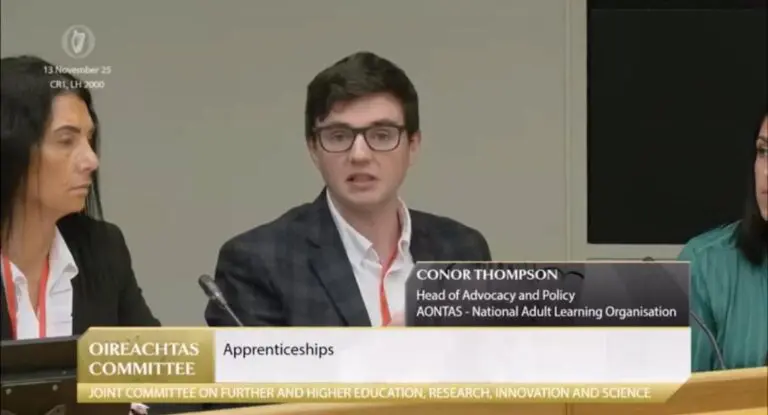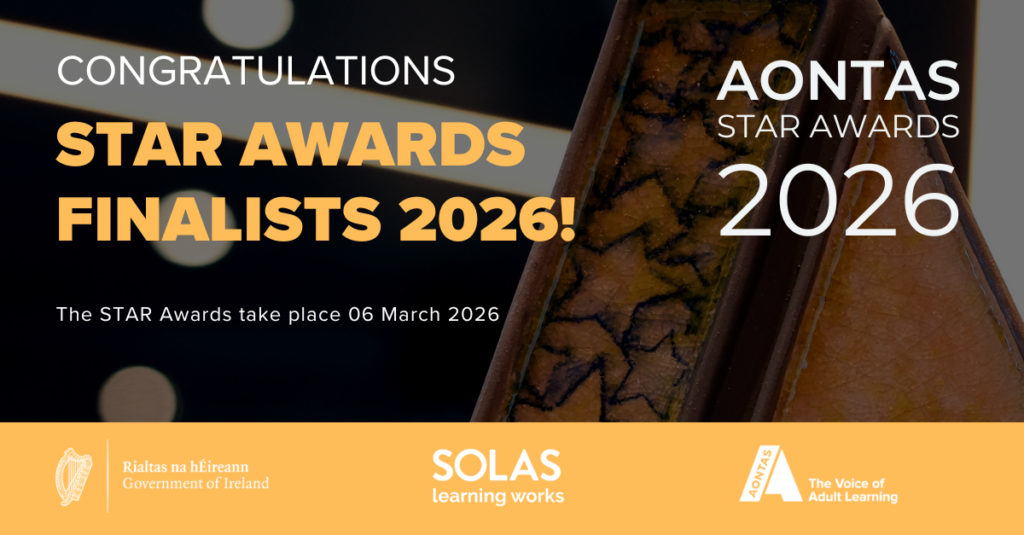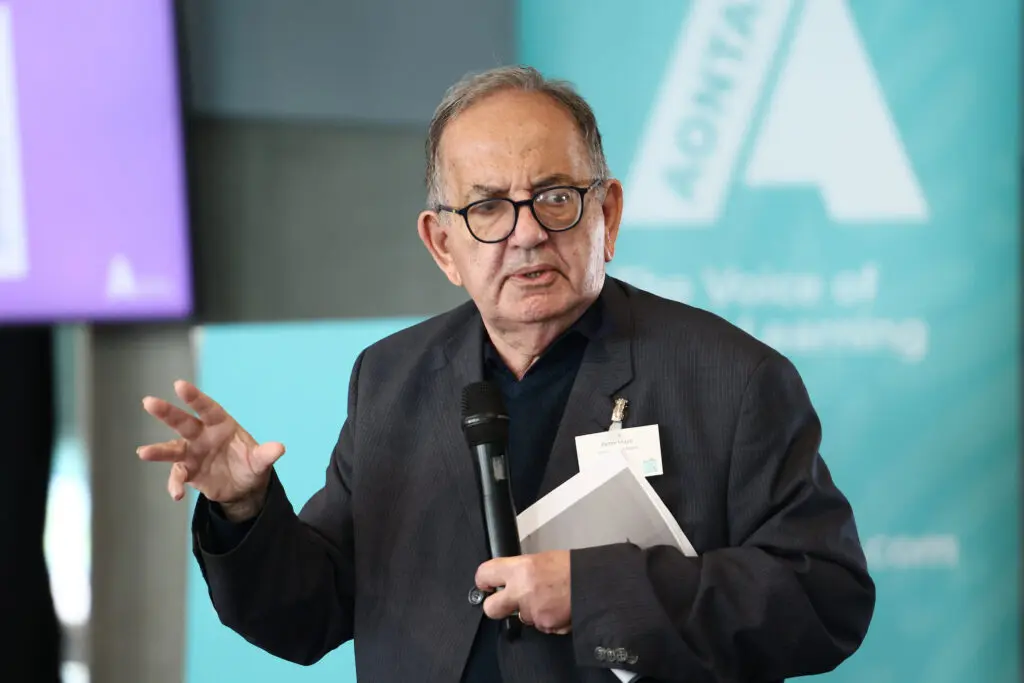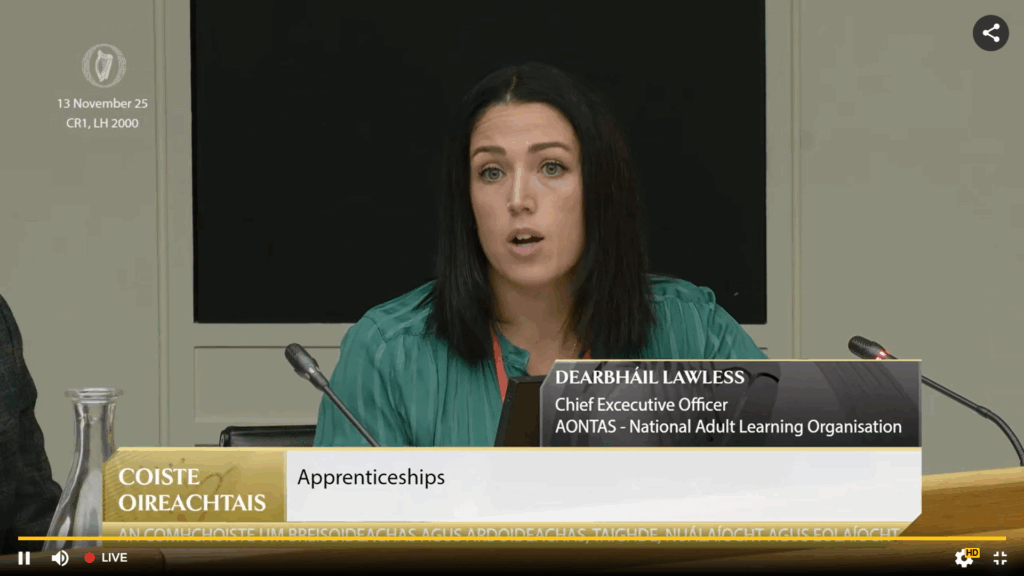AONTAS calls for inclusive, well-supported apprenticeships at Oireachtas Committee
AONTAS calls for inclusive, well-supported apprenticeships at Oireachtas Committee
Today, our Chief Executive Officer Dearbháil Lawless and Conor Thompson, Head of Advocacy and Policy at AONTAS, appeared before the Joint Committee on Further and Higher Education, Research, Innovation and Science to deliver a clear message:
Apprenticeships must be accessible, properly supported, and recognised as a first-choice pathway for learners of all ages and backgrounds.
AONTAS appeared at the committee alongside Bridget Kelly, National Traveller Policy Coordinator for Employment and Enterprise, and Rossa Gilsenan, TAIP Administrator, both from the Irish Traveller Movement, as well as Anne Marie McDonnell, Head of Programme and Service Design, and Adrian Stewart, Head of Employability, from the Rehab Group.
Together, we contributed evidence and recommendations to the Committee’s discussion on apprenticeships and access to education and employment opportunities.
Apprenticeships as a tool for social justice
AONTAS’ opening statement reminded the Committee that Further Education and Training (FET) underpins the skills that keep Ireland running, from stonemasonry and plumbing to ICT and emerging green technologies. Beyond their economic importance, FET and apprenticeships play a vital social role, offering opportunities to those who have experienced poverty, trauma, discrimination, or unmet literacy needs.
AONTAS set out a vision for apprenticeships that are:
- Inclusive: open to people regardless of gender, age, geography, or socio-economic background
- Representative: reflecting the diversity of Irish society
- Transformative: offering genuine routes to secure, fulfilling employment for those furthest from education and the labour market
“Those closest to the problem are closest to the solution” was a central theme, as AONTAS highlighted the importance of placing learner voice at the heart of apprenticeship policy and programme design, rather than treating it as an add-on.
What apprentices are telling us
The briefing paper presented to the Committee draws on findings from the National FET Learner Forum (NFLF), which has engaged more than 15,000 learners since 2016. In 2024–2025 alone, 1,858 learners took part, with apprentices making up 5% of participants.
The evidence shows that while apprenticeships help to build confidence and optimism, many apprentices face significant financial and practical challenges:
- 61% of apprentices reported increased self-confidence as a result of their course
- 58% reported a more positive outlook on their future
- 36% said their financial situation affects their ability to learn or study, compared with 24% of all FET learners
Apprentices also reported lower satisfaction with key supports such as travel, meals and financial assistance. Satisfaction with meal support was 24% lower than the wider group of learners, travel support 17% lower, and financial support 12% lower..
One Commis Chef apprentice explained:
“No one in my class gets paid… I have to work outside of my hours of the course. This affects my study as I can’t come in sometimes because I don’t have the money.”
Others described being sent long distances for training, often at short notice and high personal cost:
“You don’t know where you’re going to get… it could be down the country… You get a month’s notice or two weeks.”
Accommodation and travel costs were described as “astronomical”, with some apprentices struggling to afford overnight stays. Learners also spoke of outdated equipment and textbooks that no longer match industry standards, leaving them feeling unprepared for the workplace.
Three steps towards inclusive apprenticeships
Drawing on evidence and the lived experiences of learners, AONTAS outlined three key recommendations to the Committee, emphasising that apprenticeships can only become a true first-choice option when they reflect the realities of learners’ lives.
- Enhance financial support
Apprentices told us that low wages and the high cost of taking part in training can make it hard to stay on their course. 36% said their financial situation affects their ability to learn or study, compared with 24% of all learners. Stronger financial supports would help more people complete their apprenticeships and get the most from their learning. - Improve local access to courses
Many apprentices face long waiting lists or have to travel long distances to find a course, adding extra costs for travel, meals and accommodation. Making courses available closer to home would reduce these pressures and make apprenticeships more accessible to everyone. - Update equipment and curriculum
Apprentices want their training to reflect today’s workplaces. Learners in areas like Electrical Apprenticeships, ICT, Coding and Programming have called for more up-to-date equipment and materials to keep pace with industry standards.
Shared learning across Ireland and beyond
We emphasised the value of shared learning, both across the island of Ireland and internationally, to strengthen apprenticeship opportunities.
One example comes from Northern Ireland, where public procurement policy includes a 10% social value weighting in tenders. This model rewards employers who contribute to community benefit, diversity and workforce development. Adopting similar measures in Ireland would help strengthen links between apprenticeships, local communities and wider social outcomes.
AONTAS also drew attention to international examples where apprenticeships are designed around collaboration and learner success. In Switzerland, a joined-up approach connects schools, career services, social supports and employers so that learners at risk of leaving education receive early and practical help to stay on track. Germany offers another model, where employers work in close partnership with training providers to shape course design, assessment and certification, and where smaller businesses receive specific support to take on apprentices. In Finland, a flexible, modular system allows learners to progress at their own pace, combining classroom and workplace learning in ways that reflect real industry needs.
“FET is for everyone”
In closing, we reaffirmed that Further Education and Training (FET) and apprenticeships should not be seen as a “second chance” option, but as high-quality, equal routes to learning and meaningful work. Achieving this will require sustained investment, supportive policy, and a shared commitment to equality.
AONTAS will continue to work with Government, Education and Training Boards (ETBs), employers and partners across the sector to build an apprenticeship system that is inclusive, empowering and shaped by the voices of learners.
You can read the full Opening Statement and Supporting Evidence Paper submitted to the Committee here.
The findings shared with the Committee are backed by the upcoming Learner Voices Across Ireland Report, which will be launched at the AONTAS Adult Education Summit on 19 November.

News
The very latest news from the adult and community education sector
News

AONTAS Announces 2026 STAR Awards Shortlist!
16 January 2026
News

AONTAS Featured in International Adult Education Journal
22 December 2025
AONTAS Featured in International Adult Education Journal Written by Megan Fearon Published on December 22, 2025 Share This AONTAS are...
Blog

Learners as Leaders: Stories from the Community Changemakers Programme
19 December 2025
Learners as Leaders: Stories from the Community Changemakers Programme Written by Larisa Sioneriu Published on December 19, 2025 Share This...
Blog

Lus Na Gréine: Where Community, Learning, and Hope Flourish
18 December 2025
Lus Na Gréine: Where Community, Learning, and Hope Flourish Written by Lorraine O’Connor Published on December 18, 2025 Share This...
Blog

Lus Na Gréine: Where Community, Learning, and Hope Flourish
18 December 2025
Lus Na Gréine: Where Community, Learning, and Hope Flourish Written by Lorraine O’Connor Published on December 18, 2025 Share This...
Blog

Learning Across Borders: Slovakia’s Adult Education Delegation Visits Ireland
18 December 2025
Learning Across Borders: Slovakia’s Adult Education Delegation Visits Ireland Written by Lucia Bielikova Published on December 18, 2025 Share This...
AONTAS calls for inclusive, well-supported apprenticeships at Oireachtas Committee
AONTAS calls for inclusive, well-supported apprenticeships at Oireachtas Committee
Today, our Chief Executive Officer Dearbháil Lawless and Conor Thompson, Head of Advocacy and Policy at AONTAS, appeared before the Joint Committee on Further and Higher Education, Research, Innovation and Science to deliver a clear message:
Apprenticeships must be accessible, properly supported, and recognised as a first-choice pathway for learners of all ages and backgrounds.
AONTAS appeared at the committee alongside Bridget Kelly, National Traveller Policy Coordinator for Employment and Enterprise, and Rossa Gilsenan, TAIP Administrator, both from the Irish Traveller Movement, as well as Anne Marie McDonnell, Head of Programme and Service Design, and Adrian Stewart, Head of Employability, from the Rehab Group.
Together, we contributed evidence and recommendations to the Committee’s discussion on apprenticeships and access to education and employment opportunities.
Apprenticeships as a tool for social justice
AONTAS’ opening statement reminded the Committee that Further Education and Training (FET) underpins the skills that keep Ireland running, from stonemasonry and plumbing to ICT and emerging green technologies. Beyond their economic importance, FET and apprenticeships play a vital social role, offering opportunities to those who have experienced poverty, trauma, discrimination, or unmet literacy needs.
AONTAS set out a vision for apprenticeships that are:
- Inclusive: open to people regardless of gender, age, geography, or socio-economic background
- Representative: reflecting the diversity of Irish society
- Transformative: offering genuine routes to secure, fulfilling employment for those furthest from education and the labour market
“Those closest to the problem are closest to the solution” was a central theme, as AONTAS highlighted the importance of placing learner voice at the heart of apprenticeship policy and programme design, rather than treating it as an add-on.
What apprentices are telling us
The briefing paper presented to the Committee draws on findings from the National FET Learner Forum (NFLF), which has engaged more than 15,000 learners since 2016. In 2024–2025 alone, 1,858 learners took part, with apprentices making up 5% of participants.
The evidence shows that while apprenticeships help to build confidence and optimism, many apprentices face significant financial and practical challenges:
- 61% of apprentices reported increased self-confidence as a result of their course
- 58% reported a more positive outlook on their future
- 36% said their financial situation affects their ability to learn or study, compared with 24% of all FET learners
Apprentices also reported lower satisfaction with key supports such as travel, meals and financial assistance. Satisfaction with meal support was 24% lower than the wider group of learners, travel support 17% lower, and financial support 12% lower..
One Commis Chef apprentice explained:
“No one in my class gets paid… I have to work outside of my hours of the course. This affects my study as I can’t come in sometimes because I don’t have the money.”
Others described being sent long distances for training, often at short notice and high personal cost:
“You don’t know where you’re going to get… it could be down the country… You get a month’s notice or two weeks.”
Accommodation and travel costs were described as “astronomical”, with some apprentices struggling to afford overnight stays. Learners also spoke of outdated equipment and textbooks that no longer match industry standards, leaving them feeling unprepared for the workplace.
Three steps towards inclusive apprenticeships
Drawing on evidence and the lived experiences of learners, AONTAS outlined three key recommendations to the Committee, emphasising that apprenticeships can only become a true first-choice option when they reflect the realities of learners’ lives.
- Enhance financial support
Apprentices told us that low wages and the high cost of taking part in training can make it hard to stay on their course. 36% said their financial situation affects their ability to learn or study, compared with 24% of all learners. Stronger financial supports would help more people complete their apprenticeships and get the most from their learning. - Improve local access to courses
Many apprentices face long waiting lists or have to travel long distances to find a course, adding extra costs for travel, meals and accommodation. Making courses available closer to home would reduce these pressures and make apprenticeships more accessible to everyone. - Update equipment and curriculum
Apprentices want their training to reflect today’s workplaces. Learners in areas like Electrical Apprenticeships, ICT, Coding and Programming have called for more up-to-date equipment and materials to keep pace with industry standards.
Shared learning across Ireland and beyond
We emphasised the value of shared learning, both across the island of Ireland and internationally, to strengthen apprenticeship opportunities.
One example comes from Northern Ireland, where public procurement policy includes a 10% social value weighting in tenders. This model rewards employers who contribute to community benefit, diversity and workforce development. Adopting similar measures in Ireland would help strengthen links between apprenticeships, local communities and wider social outcomes.
AONTAS also drew attention to international examples where apprenticeships are designed around collaboration and learner success. In Switzerland, a joined-up approach connects schools, career services, social supports and employers so that learners at risk of leaving education receive early and practical help to stay on track. Germany offers another model, where employers work in close partnership with training providers to shape course design, assessment and certification, and where smaller businesses receive specific support to take on apprentices. In Finland, a flexible, modular system allows learners to progress at their own pace, combining classroom and workplace learning in ways that reflect real industry needs.
“FET is for everyone”
In closing, we reaffirmed that Further Education and Training (FET) and apprenticeships should not be seen as a “second chance” option, but as high-quality, equal routes to learning and meaningful work. Achieving this will require sustained investment, supportive policy, and a shared commitment to equality.
AONTAS will continue to work with Government, Education and Training Boards (ETBs), employers and partners across the sector to build an apprenticeship system that is inclusive, empowering and shaped by the voices of learners.
You can read the full Opening Statement and Supporting Evidence Paper submitted to the Committee here.
The findings shared with the Committee are backed by the upcoming Learner Voices Across Ireland Report, which will be launched at the AONTAS Adult Education Summit on 19 November.

News
The very latest news from the adult and community education sector
News

AONTAS Announces 2026 STAR Awards Shortlist!
16 January 2026
News

AONTAS Featured in International Adult Education Journal
22 December 2025
AONTAS Featured in International Adult Education Journal Written by Megan Fearon Published on December 22, 2025 Share This AONTAS are...
Blog

Learners as Leaders: Stories from the Community Changemakers Programme
19 December 2025
Learners as Leaders: Stories from the Community Changemakers Programme Written by Larisa Sioneriu Published on December 19, 2025 Share This...
Blog

Lus Na Gréine: Where Community, Learning, and Hope Flourish
18 December 2025
Lus Na Gréine: Where Community, Learning, and Hope Flourish Written by Lorraine O’Connor Published on December 18, 2025 Share This...
Blog

Lus Na Gréine: Where Community, Learning, and Hope Flourish
18 December 2025
Lus Na Gréine: Where Community, Learning, and Hope Flourish Written by Lorraine O’Connor Published on December 18, 2025 Share This...
Blog

Learning Across Borders: Slovakia’s Adult Education Delegation Visits Ireland
18 December 2025
Learning Across Borders: Slovakia’s Adult Education Delegation Visits Ireland Written by Lucia Bielikova Published on December 18, 2025 Share This...
